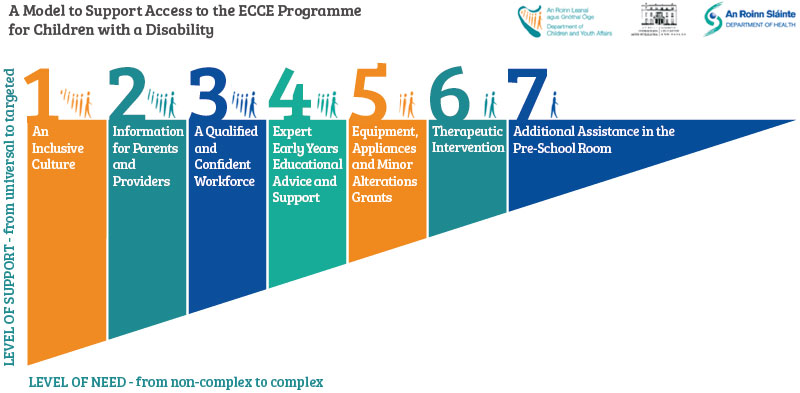

When Covid-19 prevented training for Early Childhood professionals and parents from being delivered in the usual way, Better Start and the Hanen Centre had to respond. This article reflects on the experience of developing and delivering Hanen’s ‘Teacher Talk’ online.
The Access and Inclusion Model (AIM) provides a range of supports to ensure that children with disabilities can access the Early Childhood Care and Education (ECCE) programme. In the seven-stepped model, levels 1–3 provide universal supports designed to promote an inclusive culture. Level 3 provides for a ‘broad multi-annual programme of training’ designed to build a ‘confident and competent’ workforce (DCYA, 2020).
At level 3, Better Start Early Years specialists deliver Teacher Talk under licence to the Hanen Centre. The Hanen approach to language development recognises the challenge of creating inclusive learning environments for children with a learning disability: ‘A child with special needs requires very specific and consistent support to become an active and participating member of the classroom’ (Weitzman and Greenberg, 2002). Teacher Talk provides a step-by-step approach to providing that support through a series of interactive strategies. Better Start began delivering Teacher Talk in 2018, and by March 2020, 1,116 early years practitioners had completed it. As the Covid-19 pandemic hit, and all schools and education facilities for early years and care were closed, all training was paused.
Here, along with Janice Greenberg, Director of Early Childhood Education Services, The Hanen Centre, Toronto, Canada, I reflect on the challenges to both the Hanen Centre and Better Start of moving to an online training environment while maintaining our commitment to supporting the Early Learning and Care (ELC) sector and the integrity of Teacher Talk. We discuss the challenge of using webinar tools and the potential of using a learning management system for both tutors and learners.

The onset of the pandemic has challenged all of us to re-evaluate how we do our work given the current restrictions. This has certainly been true at the Hanen Centre, where we were faced with how to continue to provide training to professionals and parents when we could no longer congregate in the same physical space.
Teacher Talk training is one of Hanen’s offerings that we converted relatively quickly to an online format. Traditionally, Teacher Talk has been offered as three one-day in-person trainings that provide an overview of key strategies. Early-childhood educators learn how to promote learning and language development through a variety of daily activities.
The structure and format of Teacher Talk derive from evidence-based best practices that promote adult learning. These include:
During in-person Teacher Talk sessions, these principles are implemented through frequent opportunities for large-group discussions, small-group activities and brainstorming, and practice role plays where learners try out new language-facilitating strategies.
In developing the online version of Teacher Talk, we were challenged by how to maximise participant engagement. We started by selecting an online platform that allowed for:
So far, one of the Teacher Talk trainings, ‘Encouraging Language Development in Early Childhood Settings’, has been converted to an online version (Janice Greenberg, Director of Early Childhood Education Services, The Hanen Centre, Toronto).
As the pandemic began, Better Start was in the process of commissioning a learning management system that would administer training and develop both synchronous and asynchronous content. This work was still in progress on 29 May when Better Start received Hanen’s Teacher Talk online content ‘Encouraging Language Development in Early Childhood Settings’. A number of tasks lay ahead:
[ctt template=”1″ link=”7aImj” via=”yes” ]“Eight courses of ‘Encouraging Language Development in Early Childhood Settings’ were offered and completed in July–August 2020.[/ctt]
On a video call to the Hanen Centre in June, attended by licensed tutors from Canada, Australia, and the UK, there was a common thread: How, as a tutor, would you cope with the technology, and what would it mean for learner engagement? A tutor from the Hanen Centre shared her experience of delivering the content online and managing the technology, and offered tips for promoting learner engagement.
Eight courses of ‘Encouraging Language Development in Early Childhood Settings’ were offered and completed in July–August 2020. When completed, the tutors were surveyed.
What worked well:
Challenges:
Tips for promoting learner engagement:
Learners were surveyed after completing the three-session course. There were 122 responses. When learners were asked to grade the session from 1 ‘not useful’ to 5 ‘very useful’, the average score was 4.57. As a sample of their feedback, the most useful things they learned included:
[ctt template=”1″ link=”4ITDC” via=”yes” ]“When learners were asked to grade the session from 1-not useful to 5-very useful, the average score was 4.57.[/ctt]
Asked how the session could be better, 11.4% experienced technical issues, and 7.3% would have preferred a classroom learning experience. The remainder commented on the length of the tea break.
Moving towards a bichronous approach using the learning management system:
just as blended learning affords instructors and designers the opportunity to make use of the best of both online learning and face-to-face learning (e.g., flipped classrooms), bichronous online learning offers us the opportunity to integrate the best of both asynchronous and synchronous online learning experiences. (Educause, 2020)
The next round of Hanen Teacher Talk in the online format will begin at the end of September 2020. Following feedback and discussion on the test phase, supplementary asynchronous material has been developed on the learning management system to support learners in putting Hanen strategies into practice. This includes relevant slides from the ‘live’ session, a Hanen video that demonstrates the strategy, and a web form to record learners’ reflection on using the strategy and the child’s response. The learners’ reflections will be available to the tutor before the next session, so learners have the opportunity to share their experiences, linking the live session to practice in early learning and care settings.
We could not have foreseen the changes that would take place due to the pandemic. Both the Hanen Centre and Better Start had to adapt quickly to a new online learning environment. Better Start’s thinking on how we engage learners continues to evolve. For the foreseeable future, it seems that learning and development programmes will largely be delivered remotely, through the use of available technologies, and this will continue to affect learner experiences.
We intend to continue to review and adapt our modes of delivery, in consultation with participants and collaborating partners, to maximise engagement and ensure that continuing professional development remains available. We hope that the content we provide, using synchronous and asynchronous material, will support our mentoring role and the training we deliver, as our engagement with this new learning environment continues to evolve. In this we are not alone: ‘Research suggests that online learning has been shown to increase retention of information, and take less time, meaning the changes coronavirus have caused might be here to stay’ (World Economic Forum, 2020).
REFERENCES
Department of Children and Youth Affairs (DCYA) (2020) Access and Inclusion Model (AIM). https://aim.gov.ie/.
Educause (2020) Bichronous Online Learning: Blending Asynchronous and Synchronous Online Learning. https://er.educause.edu/articles/2020/9/bichronous-online-learning-blending-asynchronous-and-synchronous-online-learning.
Weitzman, E. and Greenberg, J. (2002) Learning Language and Loving it: A Guide to Promoting Children’s Social, Language, and Literacy Development in Early Childhood Settings. Toronto: Hanen Centre.
World Economic Forum (2020) ‘The COVID-19 pandemic has changed education forever. This is how’. www.weforum.org/agenda/2020/04/coronavirus-education-global-covid19-online-digital-learning/.
Copyright © Education Matters ® | Website Design by Artvaark Design